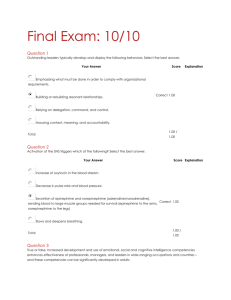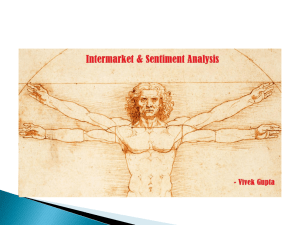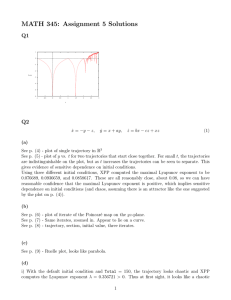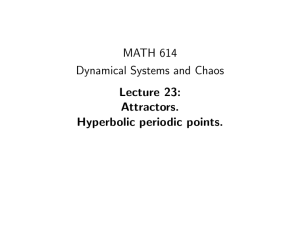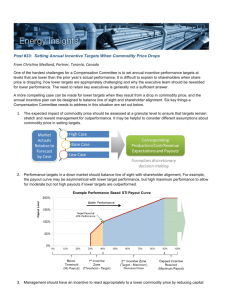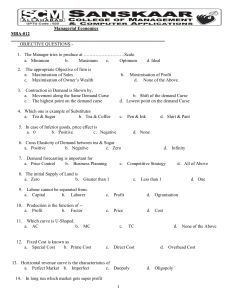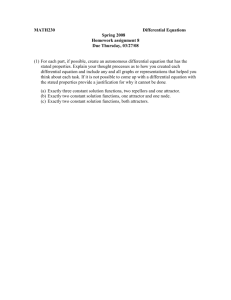WAY TOWARDS AN IDEAL ECONOMIC SOCIETY
advertisement
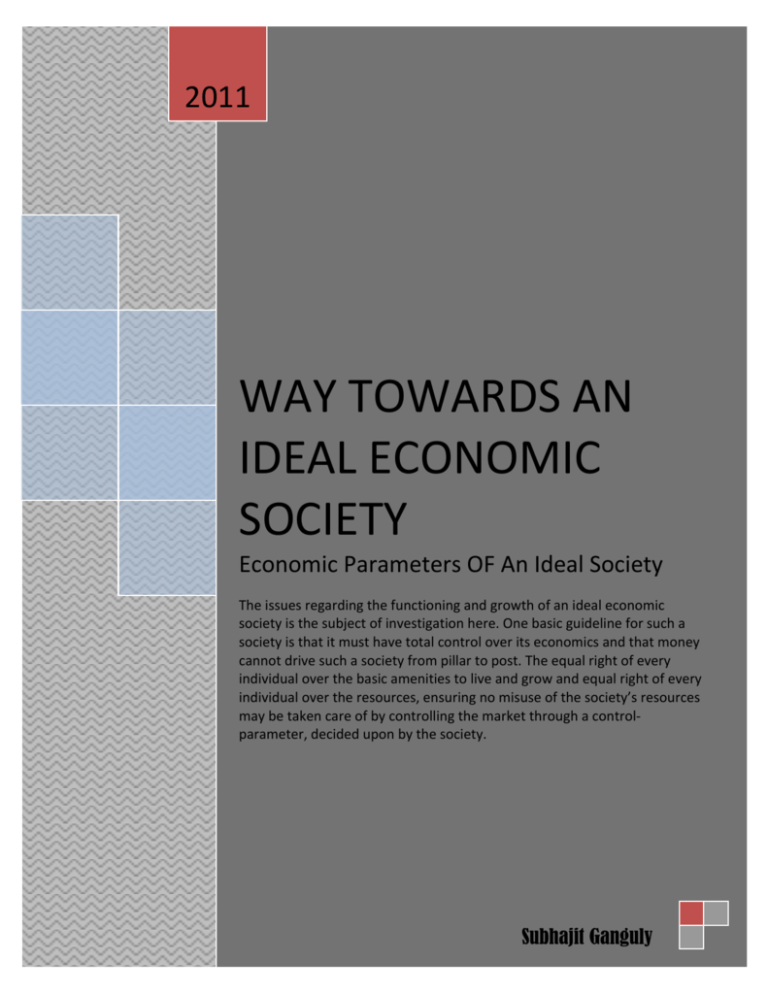
2011
WAY TOWARDS AN
IDEAL ECONOMIC
SOCIETY
Economic Parameters OF An Ideal Society
The issues regarding the functioning and growth of an ideal economic
society is the subject of investigation here. One basic guideline for such a
society is that it must have total control over its economics and that money
cannot drive such a society from pillar to post. The equal right of every
individual over the basic amenities to live and grow and equal right of every
individual over the resources, ensuring no misuse of the society’s resources
may be taken care of by controlling the market through a controlparameter, decided upon by the society.
Subhajit Ganguly
ECONOMIC PARAMETERS OF AN IDEAL SOCIETY
Subhajit Ganguly, 78/4,Selimpur Road, Dhakuria, Kolkata-700031 (India), Email-id:-gangulysubhajit@indiatimes.com
ABSTRACT:
The issues regarding the functioning and growth of an ideal economic society is the
subject of investigation here. One basic guideline for such a society is that it must have total
control over its economics and that money cannot drive such a society from pillar to post. The
equal right of every individual over the basic amenities to live and grow and equal right of every
individual over the resources, ensuring no misuse of the society’s resources may be taken care
of by controlling the market through a control-parameter, decided upon by the society.
INTRODUCTION:
An ideal economic society may be defined as one every individual has a right
regarding the access to the basic minimum necessities, viz., food, primary education, a place to
live, etc. Thrust, in such a society, must be placed over:
1) The right of every individual to have access to the minimum average want to be alive as
a human being. This minimum average want in some cases (like education, medical
facilities, etc.) may be increased as the society progresses.
2) No excess using up of resources. An ideal use of resources by such a society will imply
making production exactly equal to demand.
In such a society, where there will be a fulfillment of the basic minimum individual
needs and the right use of resources, no hoarding up of resources by one individual or a
group of individuals can be entertained, as this may hamper the smooth running of such a
society. Every individual, in such a society, must have equal rights over the available
resources and none can be filthy rich. The society, as a whole, too, will be able to take up
demanding projects (such as space-exploration) and none will have to bear the burnt for
this more than others.
Making use of the concepts from my paper viXra:1101.0035 with respect to
economic parameters, the viability of such an ideal economic society may be investigated.
Developing this idea for such a society, a chaos-analysis regarding the various market-forces
may also be done.
2
CONTROL PARAMETER FOR AN IDEAL ECONOMIC SOCIETY:
In order to formulate a control-parameter for an ideal economic society, a
treatment similar to the one used in my paper viXra:1101.0035 is utilized. The controlparameter will decide the market-forces and the whole of the economics of such a society
will be under human-control. Human beings, in such a society, will not be mere players in
the hands of the market-forces but still be able to regulate them completely to the
advantage of the society.
The equation that is made use of here is T=ω(DR/גS)F
…..(1)
Where, (T) represents time of flow, (ω) is a constant for the given system, (D) is the distance
between two points (one initial and the other ‘final’) between which the flow takes place, (R)
represents the resistance against the flow and (S) the support towards it, ( )גrepresents the
difference in concentrations of the concerned commodity between the initial and the final
points, and finally, (F) represents the amount of flow itself.
Now let us consider an individual buyer in an ideal economic society, where the minimum
average want equals (W). Let, the time relevance of the minimum average want be (T).The
price (p) of the concerned commodity offers a resistance against the commodity being bought
and the buying-power (b) of the individual supports the event of the commodity being bought.
For the direct transaction, without the presence of middle men, (D) of the above equation is
irrelevant for consideration. The actual flow (F) that must ideally take place during the
stipulated time (T) must be equal to the minimum average want (W) of the individual. If total
production of the given commodity by the society is (P) then difference in concentrations ( )גof
the commodity between the market and the individual buyer is; f=P-W
Replacing all these relevant values in equation (1) we have;
i.e.;
ω = Tfb/pW
ω = NfB
..…(2)
Where, relevance N=T/W and buyability B = b/p, f = P-W
Also, let (D) represents the demand of the commodity in the society as a whole, with a
population (x), whereby; D=Wx.
The price (p) of the commodity, naturally, depends inversely upon production (P) and directly
upon depend (D).For an ideal economic society, where every individual’s minimum average
want is met, we may write,
P = ω (D/P)
…..(3)
3
The constant (ω) here acts as the control-parameter, which can be made use of by the society
in order to provide for the basic needs of every individual. The other requirement of an ideal
economic society being, no misuse of resources, the total demand and the total production
must be made equal, i.e.; D=P, such that, p=w
Placing this condition in equation (2) we get;
W = √ [{T (P-W) b}/W]
…..(3)
Equation (3) gives the value of the control-index of the market forces for an ideal economic
society. However, when demand exceeds production, price is bound to increase, as usual
deviating W beyond its ideal value. In order to fix the value of W, the buyability (B=b/p) of the
given commodity has to remain fixed. This may be done artificially by increasing the buyingpower (b) of the individuals. Similarly, in case of over-production, price decreases. Thereby
diminishing the value w from the ideal. This again may be checked by keeping the buyability
fixed, artificially. What it means is that even if the ideal economic society deviates from its
ideal, every individual must equally bear the burnt and none is unnecessarily penalized more
than others.
CHAOS ANALYSIS:
Let us throw in a more statistical approach to a given set of observations of the
control-index (ω). The control-index, though ideally a constant, may not be so in a practical
society. However, in trying to reach the ideal state, (w) too is bound to be made to move
towards a constant ideal value, as decided upon by the society. The logical equation (due to
May) for w may be written
ω t+1 = k ω t (1 – ω t)
…..(4)
Where k is a deliberate constant.
The quadratic-map (Lorentz) can be written as,
ω t+1 = k – ω t2
……(5)
All trajectories described by the quadratic-map become asymptotic to -∞,
K < -0.25 and k>2.
As we deal with the movement of the control-parameter (w) towards one given ideal value, the
expression for the attractor is,
ω * = (1-1/k)
…..(6)
Where, 0<k<3.
4
ω * is a point in the dimensional plot onto which the trajectories seem to crowd. The
trajectories tend to revisit the attractor ‘point’ or the desired ideal value of (ω), as set by the
ideal economic society. For k > 3, the trajectory behavior becomes increasingly sensitive to the
value of k. For k < 1, the attractor is a fixed point and has a value equal to zero. For 1<k<3, then
attractor is again affixed point and its value is greater than zero but less than 0.667. For
3<k<3.57, period doubling will occur, with the attractor consisting of 2,4,8, etc., periodic points
as the value of k increases within that range. For 3.57<k<4, we have the region of chaos, where
the attractor can be erratic (chaotic, with infinitely many points) or stable. For all our
calculations we palace the desired conditions at the attractor. It is to be noted that the value of
xt in the quadratic-map (5) ranges from -2 to +2, generally in the region of chaos, we apply the
method of searching for windows or zeroes of values of k for which interaction from any
standard value w0, will produce the periodic attractor, instead of the chaotic one. The most
common such window for the logistic equation lies at k ≈ 3.83 and for the quadratic-map at
k ≈ 1.76.
CONCLUSION:
The society must be able to provide for the basic needs of every individual. The
society and the whole of its economics must not make puppets of the individuals. It is the
individuals who must be gaining from the system. The very existence of the human society and
its economic systems must give the individuals access to an equal right over the basic amenities
and nurture them to grow towards their fulfillment. Everyone of them must be given an equal
footing to launch themselves towards this goal. None should go hungry while some others
glutton around, no merit should go unattended while a few others with much less talent be
given undue advantages. All should be given equal chances. All men are not equal. But what a
civilized human society must be able to insure is, equal chances for all to grow healthily. An
economic control by reigning the market-forces through the control-index will, to a great
extent, ensure such a liberation of the society at the individual level. No society can truly
progress with even one individual being left out, that is for sure.
An argument against such economic measures may be:
1) Money drives people to work and grow. A surety to it will make them lazy.
2) All countries or states within a country may not comply with such regulations of the
market. Some societies will gain more than others from this.
As for the first point of argument, the very notion that money drives people is insulting enough.
It is for human beings that money came into being in the first place, not the other way round.
Therefore, human beings must, most definitely, have to gain total control over money, not the
other way round. Lack of money must not make people to stoop low, to cheat, to thieve, if any
semblance of progress we are to honestly ensure. In an ideal economic society, none has to
depend upon money to meet his/her basic needs, as the society and its economic system
ensures that. Then and only then, we can say that everyone will have equal chances provided
for by the society itself to work-the kind of work that is inspired by the freedom of choice inside
5
each of the individuals, the kind of work that truly befits human beings, though liberated and
fearless equal right to grow and live like human.
With regards to the second point of argument, a society, which complies with and strives to
become economically ideal will gain over others who do not comply, as the former ensures the
well being of all its individuals and help them grow stronger. As progress is made at the
individual level, no force can hold back such an ideal economic society from its growth, as a
whole, from strength to strength. The immediate deficits that may arise in such a society (as in
the field of defense) may be taken care of by the society as a whole, as only such a society can
claim to have true control over its economics. The deficits must be shared by its individuals,
equally. When true growth is insured at the micro-level, what force can hold back progress and
strength at the macro-level?
6

